






A Quarterly Publication
To provide news and opinion to support professional growth and personal connections within the Berks County Medical Society community.
Berks
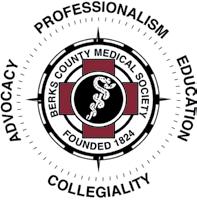
MEDICAL RECORD
D. Michael Baxter, MD, Editor Editorial Board
D. Michael Baxter, MD
Lucy J. Cairns, MD
Shannon Marie Foster, MD, FACS
Raymond C. Truex, Jr., MD, FACS, FAANS

Jillian Ventuzelo, DO
T. J. Huckleberry, MPA
William Santoro, MD, FASAM, DABAM
16
Jillian Ventuzelo, DO President
William Santoro, MD President Elect
Kristen Sandel, MD
Chair, Executive Council
Ankit Shah, MD Treasurer
Jin Xu, MD Secretary
Michael L. Haas, MD
Immediate Past President
T. J. Huckleberry, MPA Executive Director
Berks County Medical Society
Phone: 610.375.6555 | Fax: 610.375.6535
Email: info@berkscms.org www.berkscms.org
The opinions expressed in these pages are those of the individual authors and not necessarily those of the Berks County Medical Society. The ad material is for the information and consideration of the reader. It does not necessarily represent an endorsement or recommendation by the Berks County Medical Society.
Manuscripts offered for publication and other correspondence should be sent to 2669 Shillington Rd, Sinking Spring, PA 19608, Ste 501. The editorial board reserves the right to reject and/or alter submitted material before publication.
The Berks County Medical Record (ISSN #0736-7333) is published four times a year by the Berks County Medical Society, 2669 Shillington Rd, Sinking Spring, PA 19608, Ste 501. Subscription $50.00 per year. Periodicals postage paid at Reading, PA, and at additional mailing offices.
POSTMASTER: Please send address changes to the Berks County Medical Record, 2669 Shillington Rd, Sinking Spring, PA 19608, Ste 501.
22

26
30
Berks County Medical Society BECOME A MEMBER TODAY! Go to our website at www.berkscms.org and click on “Join Now”
33 Summer 2023 Berks County Medical Society’s Pat Sharma President’s Scholarship
34 Berks County Chosen to Lead US COVID-19 Home to Treat Program
36 In Memoriam: Richard Joel Greene, MD Clodualdo Orquiza, MD
38 LGBT Center Health Fair
5 President’s Message
6 Compass Points
8 Editor’s Comments
17 Wellness Matters: Healthy Eating
32
Content Submission: Medical Record magazine welcomes recommendations for editorial content focusing on medical practice and management issues, and health and wellness topics that impact our community. However, we only accept articles from members of the Berks County Medical Society. Submissions can be photo(s), opinion piece or article. Typed manuscripts should be submitted as Word documents (8.5 x 11) and photos should be high resolution (300dpi at 100% size used in publication). Email your submission to info@berkscms.org for review by the Editorial Board. Thank YOU!
Hoffmann Publishing Group, Inc., 2669 Shillington Road, #438, Sinking Spring, PA 19608 www.Hoffpubs.com
For Advertising Information & Opportunities Contact: Alicia Lee 610-685-0914 x210 Alicia@Hoffpubs.com Sherry Bolinger 717-979-2858 Sherry@Hoffpubs.com
Reading Hospital has been named a 2023 recipient of America’s 100 Best™ in Joint Replacement, America’s 100 Best™ in Stroke Care, and placed among the Top 5% in the Nation for GI Medical Treatment by Healthgrades®.
Healthgrades Specialty Excellence Awards recognize the top 10% of hospitals across the country in 17 specialty care areas. Reading Hospital is named as being among the:
• Top 5% in the Nation for Treatment of Stroke
• Top 10% in the Nation for Cardiac Surgery
• Top 10% in the Nation for Joint Replacement
• Top 10% in the Nation for Neurosciences
• Top 10% in the Nation for Overall Pulmonary Services
These awards acknowledge the excellent work of our entire clinical team. Learn more at TowerHealth.org/Healthgrades.

2024 will mark the 200th anniversary of the Berks County Medical Society, a truly historic achievement. Over the next two years, we will highlight some of the remarkable individuals and events that have made the history of medicine in Berks County quite memorable.

In this edition of the Medical Record, we reprint Dr. Dan Kimball’s article from our 175th Anniversary in 1999, celebrating the life of one of our earliest and most distinguished physicians, Dr. Bodo Otto. Dr. Otto served as General George Washington’s Chief Surgeon at Valley Forge and beyond. Additional historical articles will follow over the next two years.


And stay tuned for future events as we move toward our 200th Birthday Celebration.

As we prepare for that big event, BCMS is also responding to changes around us. Our leadership is currently undertaking a sweeping change of our ByLaws. We are moving from an organizational structure led by an Executive Council with a Chairperson and an Administrative Committee lead by a President, to a more efficient format. The new structure will comprise a Board of Directors chaired by the President and consisting of BCMS officers (President-elect and Treasurer) as well as committee chairs, and other appointed members including resident and medical student representatives.
More information will be forthcoming as our membership prepares to adopt the changes which we believe will streamline the work of the BCMS on behalf of our members and the work we do to improve the practice of medicine and the health of our community.



ILOVE playing basketball, but the game has completely changed. My friends and fellow 35-plus-year-old players all complain about it. The game is faster with more three-point shooting. It has essentially become what my coaches told me never to do. But that is the future of the game – a quicker, more analytical style.

When I coach my son’s teams I always ask myself, “Is what I am trying to instill in these kids going to be of value to them as they grow in this sport, or am I stubbornly trying to teach them the last remnants of my antiquated game?”
Because what use or value can I provide our future players, with outdated fundamentals for a game that has clearly evolved?
This holds true in who we are as County Societies. As an Executive Director, I often question, is what we are working toward now going to benefit physicians in five years? Or is what we are providing now creating enough value to attract the future of medicine?
In our post COVID-19 era, we all need to assess which institutions and programs will continue to generate value. Moreover, we need to explore what partnerships and collaborations will be of benefit to our Societies. Thankfully, one such collaboration is on the way!

Our long-term perspective and counseled insight provide the confidence investors need in today’s challenging environment. As a registered investment advisor, our fiduciary responsibility is only to you and the best interests of your investments.

Count on our qualified professionals for the trust, tenure and talent you can take confidence in—for the long term.
Starting in 2023, the County Medical Societies and PAMED will launch a new and exciting endeavor to provide free accredited CME courses for our members, virtually and/or in person. The County CME Collaboration Initiative or CCCI will offer monthly education, fostered by County Medical Societies, and supported by PAMED, that will not only provide free CME but open dialogue and ideas through new and diverse speakers and content from across Pennsylvania. Each month, an in-person or virtual educational event will be facilitated by one of our sister counties or PAMED and uploaded to PAMED’s online learning platform for all members to view at their leisure.
Through the work of the CCCI, in the coming months counties will be able to promote an enduring library of instant educational content for our members to utilize. We hope this new and exciting value will not only help alleviate the financial burdens and time restrictions facing all our members, but also attract new members.
In the coming months and years, we need to think in terms of not what we have already accomplished but what we can offer next. I am thrilled and proud to say that our County Medical Societies and PAMED have the foresight to seek innovative new initiatives like CCCI. With programs like these, the game will never pass us by.
If so, they may be suffering from TMJ Dysfunction and/or Sleep Disordered Breathing, such as snoring and obstructive sleep apnea. We offer comprehensive diagnosis and treatment. Our many years of experience have resulted in a high rate of successful outcomes.


Our philosophy involves a conservative, non-surgical, non-pharmaceutical approach to management with an emphasis on multidisciplinary care.


Gun violence pervades every corner of American society. Hardly a day goes by that we are not subjected to news of another mass shooting somewhere in the United States, a shocking death from domestic violence, or even a six-year-old child seriously wounding his classroom teacher as recently occurred in Virginia.
Morbidity and mortality from firearms, whether intentional or accidental, are tragedies that destroy individual lives and families while disrupting the social fabric that holds communities together. According to Berks County District Attorney John Adams, gun violence in Reading and in similar size communities across Pennsylvania is increasing. Moreover, Mr. Adams notes that when a gun is involved, any act of violence is much more likely to become lethal.
Among the worst of this violence are the all-too-common mass shootings (648 in 2022 alone according to “Gun Violence Archive,” a research/data collection organization) in our churches, synagogues, places of work, and other public venues, but none worse than in our schools. As at least one observer has noted, such acts of terror are more than tragedies, they are abominations that should not be tolerated by any civilized society. And yet is anyone truly surprised following Columbine, Sandy Hook, Parkland, and Uvalde when another school shooting occurs?

For over 30 years, since the passage of the “Brady Bill” in 1993 mandating background checks and certain other restrictions on firearm use, no additional federal firearm legislation was passed while thousands of gun-related deaths occurred each year, many involving children. Although Congress did pass the “Safer Communities Act” in 2022, critics argue that even that effort fails to protect us from the worst of this violence. As courts, government officials, community leaders, and others argue over ways to stem the increase in gun violence, it is timely to ask what role physicians and their health care colleagues can play in these efforts and specifically if there is a public health response to this national crisis which threatens lives and the safety of our communities.

The cover article in this issue of the Medical Record discusses the challenges of reducing gun violence and the opportunities for all of us, especially health care workers, to decrease such risks to health and life. At the very least we should recognize as District Attorney Adams notes: “There are too many people with too many guns with intent to do harm” to themselves or others.
The challenge is before us: “If not us who, if not now, when?” Let us seek ways to find common ground to take steps to promote gun safety and to enact and enforce “common sense” laws that protect us all and make our communities safer.
Lisa Tiger is that rare combination of passion for her business, sales skill, marketing professional and unwavering care for her clients.

The ultimate professional, Lisa is the #1 Top Producing Century 21 Agent in the State of PA, and is consistently ranked in the Top 100 in the US., but proudest of her ranking in Berks County. Lisa cares about the communities she serves, and it shows in her commitment to others.
In these challenging times, Lisa never waivers in her objective to help her clients reach their objective. It is always about YOU. When you are ready to buy or sell, Team up with the Tiger!

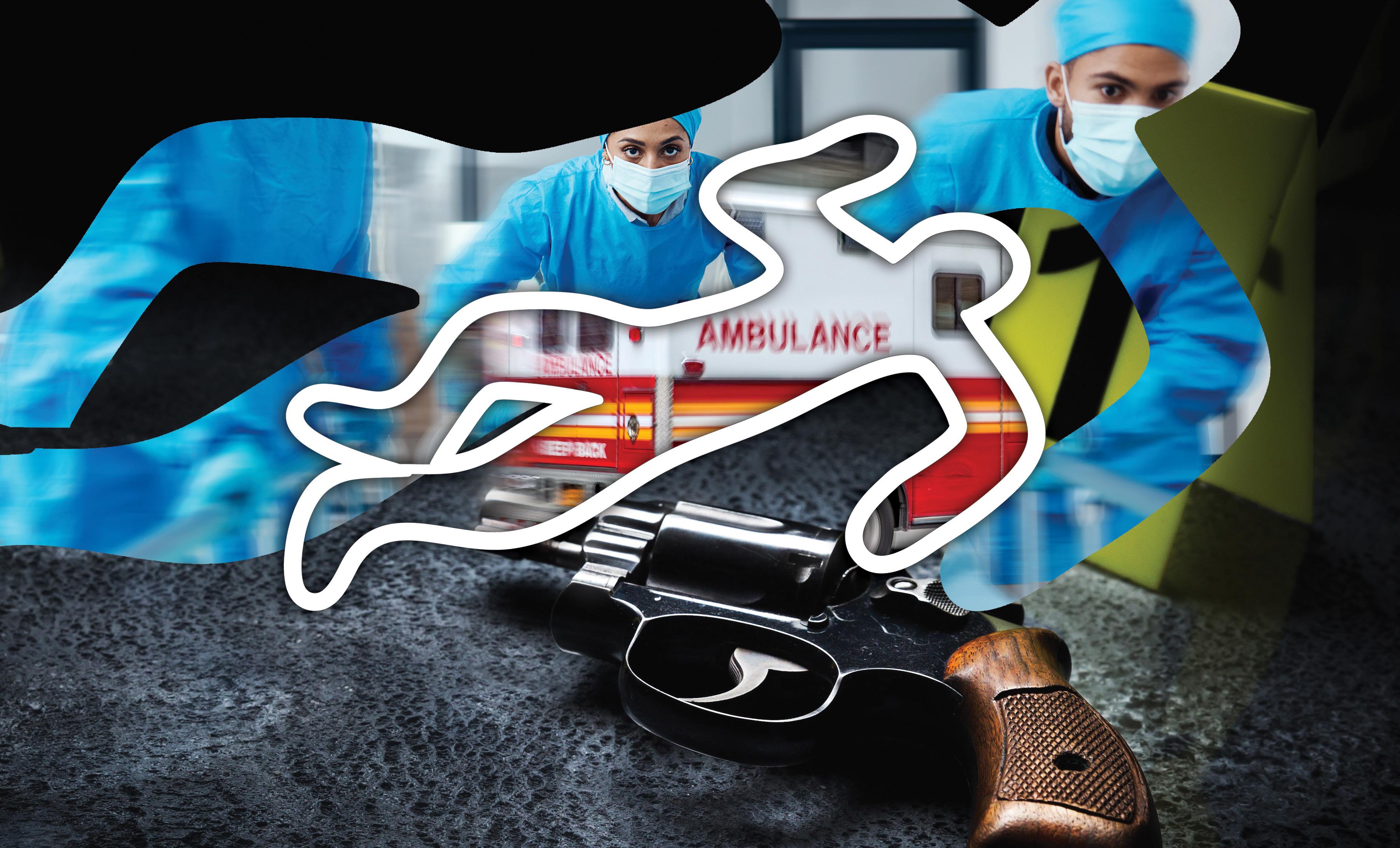 by D. Michael Baxter, MD
by D. Michael Baxter, MD
Gun violence is pervasive throughout the United States. Within just the past few weeks, news reports have described multiple episodes of gun violence. There have been record-setting numbers of gun homicides in our cities, a tragic incidence of domestic violence involving a family of eight killed by gunfire in rural Utah, and a teacher in South Carolina seriously injured in her classroom by a 6-year-old student with a gun.
Unfortunately, Berks County is no exception as we read all too frequently of a street corner shooting, a gun involved death due to domestic violence, and sadly, youth conflicts which end in loss of life because guns were present. Conflict is part of the human condition and unfortunately violence is all too frequently a result of such conflict.
According to the office of Berks County District Attorney John Adams, there were 26 homicides in the County in 2022: 22 by shootings, 3 by stabbings and 1 by strangulation. Statistics such as these reflect what Mr. Adams and other law enforcement officials have long seen, that when a gun is involved during an act of violence, serious injury or death is indeed more likely to occur.
The following table from the research organization, Gun Violence Archive, presents a statistical picture of deaths and injuries in the United States due to firearms in 2022.
Gun violence and crime incidents are collected/validated from 7,500 sources daily – Incident Reports and their source data are found at the gunviolencearchive.org website.

Footnotes
1. Number of source verified deaths and injuries
2. Number of INCIDENTS reported and verified
3. Calculation based on CDC Suicide Data
4. Actual total of all non-suicide deaths plus daily calculated suicide deaths
There is an epidemic in our nation, and it is neither due to COVID-19 nor Influenza.
These statistics are startling, not only for the total number of gun deaths but the fact that more such deaths occur due to suicide than to homicide. When a firearm is involved, death from a suicide attempt is 40 times greater than from other methods (giffords.org). Also, the number of mass shootings and murders is truly appalling and, perhaps most tragic, the number of children and youth who lose their lives from the intentional or unintentional use of guns. A recent report by the American Academy of Pediatrics states that “firearms are the leading cause of death of children and youth 0-24 years of age in the United States” {Pediatrics, December 2022; 150(6)}. In the same article, they report that “among children 5 to 14 years of age, the rate of fire-arm related suicide in the U.S. is 8 times higher than similar highincome countries.”
According to a study by the “Small Arms Survey,” an organization based in Geneva, Switzerland, and reported in Bloomberg News (www.bloomberg.com) May 25, 2022, US gun owners possess 393,000,000 firearms, an average of 120.5 firearms per 100 residents, making it “the only country with more civilian-owned weapons than people.” Due to the ready availability of guns in the U.S. and the associated high rates of morbidity and mortality, multiple professional medical organizations including the American Academy of Pediatrics, the American Academy of Family Physicians, The American College of Physicians, and the American Medical Association have called for legislation to promote gun safety and to better regulate the availability and use of firearms.
The total number of gun-related deaths in 2022 (44,239) surpassed the last annual data (2021) available for deaths due to traffic accidents (42,915) as recorded by the National Highway Traffic Safety Administration. While the (NHTSA) FY 2021 Budget for Highway Safety Research and Development was $161,200,000 (nhtsa.gov), until recently the federal government has deterred studying and preventing gun violence largely due to the “Dickey Amendment,” a provision inserted into the 1996 omnibus spending bill of the US government by Jay Dickey, a Congressman from Arkansas. This legislation mandated that “none of the
Adam J. Altman, MD
Angela Au Barbera, MD
Helga S. Barrett, OD
Jennifer H. Cho, OD, FAAO
Christine Gieringer, OD
David S. Goldberg, MD, FAAP
Marion J. Haligowski III, OD
Dawn Hornberger, OD, MS
Y. Katherine Hu, MD, MS
Lucinda A. Kauffman, OD, FAAO
Christina M. Lippe, MD
Barry C. Malloy, MD
Michael A. Malstrom, MD
Mehul H. Nagarsheth, MD
Abhishek K. Nemani, MD
Tapan P. Patel, MD, PhD
Jonathan D. Primack, MD
Kevin J. Shah, MD
Michael Smith, MD
Anastasia Traband, MD
Monica Wang, OD
Denis Wenders, OD
Linda A. Whitaker, OD, MS
With 20+ eye care specialists, Eye Consultants of Pennsylvania is the leading eye care practice in the region. Our doctors are always available for consults and referrals on eye issues, and our entire practice is committed to cooperative management of your patient. That means that we communicate and consult 360°. We share information, and we provide direct cell numbers to our partner physicians. And ultimately, it means better care and outcomes for your patients.

For consultations and referrals, call 610-378-1344.
Vision Correction (Including Bladeless LASIK) | Low Vision | Macular Degeneration | Neuro Ophthalmology Oculoplastics | Orthoptic Therapy | Pediatric Ophthalmology & Optometry | Vitreo – Retinal Surgery
funds made available for injury prevention and control at the Centers for Disease Control and Prevention (CDC) may be used to advocate or promote gun control” (Am J Public Health, 2018 July; 108(7): 865-867).
In the 26 years since the Dickey Amendment was passed, opportunities were lost while gun violence increased no more tragically than in multiple school
shootings, e.g., Columbine High School, Colorado (1999), Sandy Hook Elementary, Connecticut (2012), Stoneman Douglas High School in Parkland, Florida (2018), and Robb Elementary in Uvalde, Texas (2022) to name only a few. in addition, these years have been marked by other mass shootings in churches, synagogues, and many other public venues across our nation. continued on next page >
continued from page 11
Such horrific events elicit grief, outrage and demands to “finally” do something about gun violence in America. However, the responses to such an outcry range from those who say the problem is one of a mental health crisis, not a gun problem (after all “it’s people who kill people not guns”), to those who demand the most restrictive gun legislation possible.
The United States is unique among many nations struggling with gun violence due to a very specific, and some say problematic, provision within the U.S. Constitution.
Second Amendment:
The specifics of exactly what the framers of our Constitution intended will be debated exhaustively. (Does a “well-regulated militia” mean that anyone can have any gun anywhere at any time?) However, no one will argue that the existence of this amendment complicates the debate involved in our national and local efforts to agree on steps to reduce injuries and deaths due to firearms. This tension frequently arises between courts and legislators who attempt to regulate who can have access to which firearms under what conditions.
In July 2022, Congress passed the “Safer Community Act,” the first federal legislation regulating guns since the passage of the Brady Handgun Violence Act (the “Brady Bill”) in November 1993, a span of nearly 30 years. This legislation:
• Creates a pool of $750 million dollars to encourage states to create “Red Flag” laws which would keep deadly weapons out of the hands of individuals determined by a court to be a significant danger to themselves or others.

• Expands protection for victims of domestic violence by including convicted “dating partners” as well as spouses in data bank notifications of abuse perpetrators.
• Cracks down on illegal gun dealers.
• Expands background checks including juvenile and mental helth records for gun purchasers under 21 years of age.
• Creates federal offenses for “straw purchasing” and “gun trafficking.”
• Provides $250 million for community-based violence prevention initiatives.
However, this legislation did not include restrictions on “assault weapons,” semi-automatic weapons, or high-capacity magazines which have been key factors in many mass shootings. A Pew Research Center study in July 2022 reported that six out of ten Americans want Congress to pass even stronger gun laws (pewresearch.org).
Like so many other communities, Berks County suffers from the impact of gun violence. District Attorney John Adams sees this frequently. He states that guns are involved in approximately 90% of violent crimes that occur in our community. Furthermore, he notes that there has been an increase in homicides and gun violence in Berks and throughout much of Pennsylvania over the past two to three years. In particular, he has seen “a huge increase in the number of people charged with the offense of Persons Not to Possess” (18 PA section 6105), a statute that charges someone with illegal possession of a firearm because of an underlying criminal conviction. Our local police are especially concerned with this increase as more of their calls involve a firearm, a high-risk situation for everyone involved.
DA Adams believes we need to do a better job cutting the supply of firearms to those who are ineligible to possess but who obtain them through a “straw purchase” when another individual purchases that firearm for them. He also advocates for “legislation to completely stop the sale and possession of any type of ‘Ghost Gun’ (kits and privately made firearms that lack serial numbers and other identifying markings by design) as this type of gun has become a criminal’s best friend in their attempt to bypass our gun laws.” He states that the vast majority of our firearms crimes are committed by those who for many reasons including age, lack of a license and/ or prior criminal involvement to commit crimes with a firearm, do not have a legal right to possess one. “We see few incidents where a lawful gun owner uses a gun to commit a crime”.
One area where gun violence is all too common and tragic is the area of Domestic Violence or Intimate Partner Violence. According to Beth Garrigan, the CEO of Safe Berks, an advocacy organization for victims of intimate partner violence, abusive acts occur frequently and include psychological or physical behaviors that intimidate, manipulate, control or harm a partner, sometimes resulting in death. She states that “when guns are present in domestic violence situations, victims are five times more likely to be killed by their intimate partner.” In addition, “even if the abuser does not kill their victim, they may repeatedly use a gun to threaten, intimidate, and/or terrorize them to exert power or control.” Furthermore, the abuser
A well-regulated Militia, being necessary to the security of a free State, the right of the people to keep and bear Arms, shall not be infringed.
may additionally threaten children or other family members.
The time of greatest risk for violence is when the victim is leaving the abusive relationship and that is when Safe Berks works particularly closely with victims to develop a safety plan. She states that one important means of preventing gun violence in Domestic Abuse situations is to limit an abuser’s access to firearms through such measures as Protection from Abuse (PFA) Orders. In Pennsylvania, all final PFA orders require relinquishment of firearms. Also in PA, anyone convicted of a crime of Domestic Violence must relinquish their weapons within 24 hours. While such laws at both the state and federal level have made improvements, there are still “loopholes,” and these laws are only as effective as their enforcement provides.
Another area where gun violence has been tragically encountered is in schools. Names like Columbine, Sandy Hook, Parkland, and Uvalde have become seared into the American psyche. Although statistically schools are some of the safest places for children, when violence and particularly gun violence occurs in schools, it is devastating. The Reading School District (RSD) is particularly aware of the threats facing children and youth today that put them in harm’s way. While there will always be conflict and stressful situations for students, the rise of social media has made such problems both more pervasive and subtle. Bullying and cyberbulling as well as feelings of isolation, loneliness, anxiety, and depression can cause intense feelings leading to suicide or acts of violence. According to Anne Fisher, Director of Student Support Services in the RSD, although school social workers, counselors and nurses have primary responsibility for student mental health, school personnel at all levels receive training to recognize children in distress. The RSD employs many external community resources as well as internal resources, e.g., the Aevidum “I’ve got your back” clubs for Middle School students. Safety training occurs for students and staff and parents are encouraged to be a part of efforts to decrease conflict and support the mental and physical health of their children.
Perhaps no group in our community, other than police, are more directly affected by gun violence than our Emergency Department/ Trauma physicians, nurses, and staff. According to Ankit Shah, MD, a staff physician in the Emergency Department at Reading Hospital, his staff treats approximately 100 gunshot victims each year. There are specific security protocols, “lockdowns,” initiated and the ED staff is placed on high alert. Gun shot wounds can be superficial but all too many are devastating, requiring intensive staff time and resources and these patients with their severe life-threatening wounds can have their own traumatic emotional impact on staff. His experiences have led him to the conclusion that guns and especially high impact guns with large volume clips or the aptly named “assault weapons” should be drastically restricted due to their potential for devastating and large-scale harm. In addition, his work convinces
him of the need for effective gun safety measures. These include gun locks, separation of guns from ammunition, and secure storage requirements that will better prevent gun theft and guns from being used for criminal purposes, self-harm, or accidentally by children or others who do not have the knowledge or capability to protect themselves or others from harm.
When discussing gun violence, whether mass shootings or suicide, one issue that frequently arises is the role of mental illness. Does mental illness contribute to gun violence, and in particular, should a mental illness disqualify one from gun ownership?
Eduardo Espiridion, MD, Chair of the Department of Psychiatry at Reading Hospital/Tower Health, addressed these points. He argues that mental illness “should not be a blanket disqualification” for responsible gun ownership. However, there are psychiatric conditions, especially untreated ones, that raise alarms for safety concerns. Such individuals should be treated and addressed individually. One specific concern is “a person who is deemed high risk for completed suicide.” Such individuals should have their guns surrendered to family members or the police. It is always important to avoid stigmatizing those among us with a diagnosis of “mental illness” while seeing that they have access to the care they require.
There should be little doubt that gun violence is a major threat to the health and safety of our community. Physicians and their health care colleagues should therefore take an active role in reducing the incidence of violent firearm events as they would in preventing other threats to health and safety. Indeed, with their knowledge and experience of public health principles, physicians can be leaders in reversing this increasing tide of gun violence.
One successful example is the organization “Cure Violence Global” which is a “violence interruption program… that aims to stop the spread of violence in communities by using the methods and strategies associated with public health and disease control: detecting and interrupting conflicts, identifying and treating the highest risk individuals and changing social norms” (cvg.org). This organization was founded by Gary Slutkin, MD, a World Health Organization epidemiologist, who after ten years battling infectious diseases in Africa, returned home to the U.S. and asked why we could not employ the same public health principles to reduce our violence epidemic as he did to control HIV and tuberculosis in Africa. Over the past 20 years, “Cure Violence Global” has demonstrated proven results, through the application of public health principles in its many programs created to reduce the incidence of violence in communities around the world.

continued from page 13
What then would a public health response to gun violence add to existing efforts to reduce violence from firearms and what might physicians contribute?
A public health approach could:
• Define the problem through rigorous research.
• Describe the root causes of violence and the role of firearms in the most lethal cases.
• Describe who is most at risk as victims and as perpetrators.
• Define what factors increase the prevalence of guns and when they are used.
• Demonstrate how physicians and other health care providers can utilize data to advocate for legislative and policy changes to decrease gun violence.
• Promote legislation based on research data that restrict the availability of guns for those with intent to engage in criminal acts or harm themselves or others, e.g., universal background checks and “Red Flag” laws aimed at those with a high predilection for violence.
• Promote strong gun safety laws, e.g., mandatory gun locks so that a stolen gun or a gun found by a child cannot be fired. (If a cell phone is stolen it is basically useless without the entry passcode—why not a gun?). And mandate that firearms must be stored safely in locked areas and kept separate from ammunition.
• Conduct research into the societal factors that cause increased stress, isolation, and anger that leads to acts of violence.
• Encourage physicians and their staff to educate patients/ families about firearm safety including locked storage of guns and separation of guns from ammunition.
• Create outcome studies to evaluate what works and how to implement successful intervention strategies to reduce gun violence in our communities.
Morbidity and mortality from firearms, whether intentional or accidental, remain serious risks for everyone in our community. Physicians and their health care colleagues have a central role to play to recognize risk (are there guns at home, are they secured safely, are there high stress situations including depression, isolation, domestic or other forms of abuse present?) and to advocate for “common sense” gun legislation that improves safety and restricts highly lethal firearms and accessories, e.g., assault weapons and high-capacity ammunition magazines that have played devastating roles in our many mass shootings.
Gun violence is indeed a major public health concern, destroying not only the lives of victims and families but also dramatically impacting the well-being of the entire community. Through the dedicated efforts of health care providers, law enforcement, school officials, community agencies and all committed citizens, this epidemic can be overcome.
If there is a will, there is a way for everyone to work together to preserve lives and build a safer/healthier community.




The Berks County Medical Society is delighted to welcome Dr. Paulette Dreher to our ranks, and to the larger community she now serves. Dr. Dreher received a Bachelor of Arts in Latin and Ancient Greek from Franklin and Marshall College in Lancaster, where she was a member of the Eta Sigma Phi Honors Society and the Delphic Society for scholar athletes. While at F&M she was a member of the 2007 and 2009 National Champions Women’s Lacrosse Team, and an All-American in both Field Hockey and Lacrosse.
Dr. Dreher earned her medical degree from the Philadelphia College of Osteopathic Medicine, where she was awarded the Leonard H. Finkelstein, DO, Urology Scholarship. After a PGY-1 year in General Surgery at Hahnemann University Hospital she completed a residency in Urology at Main Line Health-Lankenau Medical Center/Bryn Mawr Hospital in Wynnewood, PA. She pursued additional training in Pediatric Urology at Alfred I. DuPont/Nemours Hospital in Wilmington, Delaware and in Urologic Oncology at Roswell Park Comprehensive Cancer Center in Buffalo, New York. During her training, Dr. Dreher was an active member of the American College of Osteopathic Surgeons, serving as Chair of the Residents Section.
Dr. Dreher has had numerous publications, as well as presentations at national and international conferences. She is a member of the American Urologic Association, American College of Osteopathic Surgeons, Society for Women in Surgery, and Philadelphia Urologic Society.

To get to know Dr. Dreher better, we asked her a few questions:

Describe the focus of your practice and any areas of special interest/ expertise.
- Interest in general urology, including BPH, kidney stones, erectile dysfunction, kidney, bladder and prostate cancer, incontinence and pelvic organ prolapse
- Robotic procedures: Nephrectomy, partial nephrectomy, Radical prostatectomies and simple prostate, Robotic Sacro colpopexy
- Particular interest in BPH performing Urolift, TURP, and robotic simple prostatectomy and female pelvic floor procedures (cystocele, rectocele, apical suspension, slings and urethral bulking)
What has brought you to Berks County?
My husband and I both attended Franklin & Marshall college in Lancaster, Pennsylvania and enjoyed the culture of central PA. We really fell in love with the Berks community when we visited, with its access to outdoors. My current practice with CUCB really drew us back to the area. The group is talented and supportive and has allowed me to feel comfortable as I begin to build my patient population, develop my own practice patterns, and continue to be a lifelong learner. I had the benefit of training as a junior resident under CUCB member Dr. Daniel Edwards, and to now be able to continue to learn from him is tremendously valuable as a new attending physician.
What do you like best about practicing medicine?

A job well done. While it is easy to find gratification when treating a malignancy,
there is another sense of gratification achieved when you treat someone for their benign entity and dramatically improve their quality of life (eg: BPH symptoms, prolapse, or pelvic pain, to name a few). Moreover, I find it most satisfying when a patient receives good care from nursing, support staff, and everyone else involved as they undergo surgery and recovery. I recently had a patient state, “You did good, doc!” and really, it cannot get better than that.
If you could change one thing about the current practice environment, what would it be?
I find it frustrating when insurance issues/cost is a barrier to patient care. I hope that we are able to find a balance of appropriate physician compensation while not burdening the patient.
Please tell us a little about your family and the activities you enjoy outside of work.
- Married to my husband of 8 years, who is a Primary Care Sports Medicine Physician. Previously he was out of Johns Hopkins and now works with Penn Medicine/LGH. We have 2 kids – Nora (3 years) and Nathaniel (11 months) – and Cooper (dog, lab mutt, 3 years).
- We enjoy hiking and have been getting to try many of the trails and park systems that Berks County has to offer, throughout the beautiful fall foliage season.
- We cheer on the F&M Diplomats, specifically Men’s Soccer and Women’s Lacrosse and Field Hockey (our alma mater teams).
- I am a native of Pittsburgh and a true to black-and-gold -Steelers fan, Penguins, and Pirates.
- Nora and Nate love playing in the creek in Wyomissing, along with their dog.
Each of us wants to successfully reach and sustain our goals, especially as we embark upon a new year. Whether you want to save money for a special vacation, declutter your office, have more date nights with your spouse, or get your eating on track, success is greatly improved with heightened focus and attention.
• Check in before eating. Ask yourself “Am I really hungry?” Listen to the natural hunger cues of a growling stomach or low energy.
• Step away from your computer or cell phone, sit down and give full attention to your food. Enjoy the flavor and aroma without distraction.
• Choose foods of various colors. Blueberries on oatmeal; red, yellow and green peppers stir fried with chicken; three bean tomato chili over brown rice. Eating the rainbow is our nutrient insurance policy and helps to boost immunity, all year long.

• Pay attention to satiety signals. Recognize when you are full, stop eating and enjoy the scrumptious leftover the next day. Take the lead from a small child who only eats half of a cookie and leaves the remainder on the table. This child is truly responding to his or her satiety cue. Over time, with exposure to super-sized everything, adults have become desensitized to this critical cue. Take the time to increase awareness again and you’ll save money and calories.
• Choose more whole foods and less processed foods. This is a familiar recommendation but remains extremely relevant through concepts such as farm to table and locally grown. Many whole foods help improve digestion, blood sugar and lipid levels, as well as satiety, thanks to their high fiber content. Processing foods often removes fiber and increases sodium and sugar.
• Add one more plant-based meal to your routine. Reap the health benefits of this tactic – decreased stroke risk, improved insulin resistance, decreased heart disease, lowered risk of some cancers, decreased inflammation, and positive impact on some mental health disorders.
• Make YOUR plan. Take a long, hard look at your habits by logging what you eat and drink for several days and target change opportunities. Set yourself up to succeed by making small goals. Build upon each change as the year progresses.
• Drink more water. Start each meal or snack with a glass of water to improve hydration and help you feel full. Water intake often lowers during the cooler months of winter. Let’s increase efforts to increase water consumption as we start this new year.
• Remember, food is the most important medicine we can take for our bodies. It’s a bonus that food is tasty and enjoyable while providing the nutrients needed for good health and healing. In closing, consuming three meals per day creates 1,095 eating opportunities during the year. Don’t be too hard on yourself if you go off track with a meal or two.
Celebrate everything the new year has to offer and stay focused on making it the best one yet!
Alcohol and marijuana have always played a significant role in drug use and have often been called gateway drugs. However, the true gateway drug is nicotine from tobacco. All of that said, the popularity of different drugs differed from one decade to another.
In the 1960s, the drug of the day was marijuana. In the 1970s, cocaine was king. In the 1980s, crack took over from cocaine. In the 1990s, methamphetamine stimulated everyone. In the 2000s, prescription opioids made their debut and continued to surge in the 2010s. In a manner of upping the ante, the 2020s saw the influx of fentanyl.
What is most notable and scary, however, is that during the past 20 years the drug of choice has been some form of opioid with increasing potency. From 2020 to the present time, those of us in Addiction Medicine have seen a decrease in urine drug screens being positive for heroin and an increase in urine drug screens being positive for fentanyl. Today, fentanyl is the predominate drug of choice. With approximately 100,000 overdose deaths in the United States each year, two-thirds of them are the result of an opioid and most of them are secondary to fentanyl.

The historic drug cartels have all but abandoned heroin in favor of fentanyl. In the past, heroin was smuggled into the country and dubbed “bricks” because it was packaged in sizes that resembled bricks. One “brick” of heroin can equate to the size of a small deck of cards of fentanyl, so the small size and increased potency make it more favorable to smuggle.
Because of its potency, even a small amount of fentanyl contamination can cause an overdose in a patient who believes they were using one drug and ended up using fentanyl. Drug dealers supply a multitude of drug options from marijuana to cocaine and methamphetamines. I often sarcastically complain that the drug dealers need a Vice President of Quality Assurance because we have seen all these substances contaminated with fentanyl.
Fentanyl has a stronger affinity to the mu opioid receptor than either methadone or buprenorphine, the two opioids used for treating opioid use disorder. This has caused a major change in the management of opioid use disorder.
When heroin and prescription opioids were popular, methadone could be titrated to a dose that took away a patient’s cravings. It could also be titrated to a dose that blocked the effects of heroin by attaching to all the available mu opioid receptor sites. But methadone, at any dose, may not block the effects of fentanyl.
In the past, a trough plasma level of methadone could be monitored to see if there was sufficient methadone to be considered a therapeutic or a blocking dose, knowing that the peak level would be even higher. But with the shift to fentanyl, it is now necessary to check a peak level of methadone to ensure that the patient is not nearing a toxic dose. Adding to this is the difficulty in obtaining a peak plasma level of methadone compared to the ease of obtaining a trough level.
A trough level can be drawn immediately before the patient receives their methadone, but a peak plasma level needs to be drawn 2 hours after the dose is given. Logistically, having a patient receive a dose of medication and then return later for a blood test can often be problematic. Furthermore, higher dosing of methadone also requires monitoring for possible QT-prolongation, a dangerous potential side effect of methadone.
The increased use of fentanyl has also caused a change in the use of buprenorphine for opioid use disorder. When heroin and other opioids were predominant, inducting to buprenorphine only required 8 to 18 hours of abstinence to avoid precipitated withdrawal.
With fentanyl, precipitated withdrawal has been known to occur up to 48 hours of abstinence before inducting with buprenorphine. Although the central effects of withdrawal from fentanyl begin in 8 to 12 hours, the peripheral effects of withdrawal may not start before 24 to 48 hours. This may be because with chronic abuse of fentanyl it is known to become stored in fatty tissue. The patient may feel withdrawal in the way of anxiety 8 to 12 hours after the last use, but the peripheral symptoms of withdrawal (nausea, vomiting, diarrhea, perspiration) may take 24 hours or longer to appear. If buprenorphine is given when only central symptoms are present, precipitated withdrawal can result.
When working with a schedule filled with so many patients, each needing our undivided attention for individual care, it is sometimes easy to miss the big picture. We need to remember that addiction is one disease, not multiple diseases. A person suffers from addiction, but the disease of addiction can be fed by multiple substances. Each substance feeding the disease of addiction may require a slightly, or massively, different approach.
As we adjust our efforts to care for patients using fentanyl, cocaine, or alcohol, we need to remind ourselves that we are not treating fentanyl addiction, cocaine addiction, or alcohol addiction. We are simply treating addiction that is being fed by different substances.

Re-printed from the MedicalRecord, February 15, 1999.
As we look back over 175 years of service to the country, it is appropriate to recognize those physicians who have set the standard for our performance, professionally and personally. One such personage who makes up an important part of that history is Dr. Bodo Otto, who came to Reading to establish his practice in 1773 and volunteered to serve with George Washington during the winter of 1777- 1778 at Valley Forge. But lest I get ahead of myself, I should start his story at its beginning.
Bodo Otto was born in 1709 to Christopher Otto and his wife of one year, Maria Neineken, in Hanover, Germany, where his father was in the service of Baron Bodo von Obergs, one of the Kings noblemen. He did well in his early scholastic studies, and his family arranged to have him apprenticed, at the young age of 13, for the study of medicine under several masters at the city of Hamburg, including experience in the treatment of several epidemic diseases, which would serve him well in his service yet to come at Valley Forge.
At 12 years of apprenticeship, he presented to the City Hall of LUNEBERG in 1736 for his oral examination. He was less qualified to practice with the physicians and surgeons of Germany and in the same year married Elizabeth, who bore him a daughter in 1737; but his wife would unfortunately die in 1738. Doctor Otto remarried in 1742 to Catherine, who bore him four children, three sons and a daughter. (Two sons would train in America to become physicians.)

Three years after the death of his father, Doctor Otto at the age of 44 and his family made a decision to leave Germany for America. We can only wonder what would lead a very successful physician, with an established family, to make the decision to risk everything, including the lives of his family, to move to the largely unknown new world. Like so many of our ancestors, Dr. Otto and his friends, seeking religious freedom and an opportunity for their children, decided to risk all and leave for America. They left Germany for Amsterdam in May 1755, and after an 8-week voyage aboard the Neptune, arrived in Philadelphia in October 1755.
Doctor Otto’s services during the smallpox epidemic of 1755 gained him a favorable reputation, and he rapidly developed a respected practice period between 1755 and 1766; he had practices in Germantown, southern New Jersey, and Philadelphia. Catherine died in 1765. He married Maria Paris in 1766 and returned to practice in Philadelphia until 1773.
Like many of his countrymen who were moving into the developing America, Dr. Otto left Philadelphia with his family in 1773 and moved up the skull valley to Reading, where he took over the Apothecary Shop of Dr. Kuhn and established his new practice period; the revolutionary spirit would soon be spreading among the colonies, and Dr. Otto was to become part of that effort.
He was chosen in 1776 to be a delegate to the provincial conference in Philadelphia, and he soon volunteered to serve as a surgeon to the militia unit formed in Berks County, losing all of his medical supplies and equipment in the battle of Long Island. He and his two physician sons would volunteer to serve General Washington as surgeons at the various hospitals set up at Valley Forge and Reading, among other sites.
Doctor John Otto would service the Reading Hospital, at Trinity Lutheran Church, while the senior Bodo would serve as senior surgeon at Valley Forge and Yellow Springs (Chester County) at the age of 65, and an age most of us are making plans for retirement, never mind volunteering for military service under the very desperate conditions.
Dr. Bodo Otto, physician patriot, was certainly a model of professionalism and service to our citizens... and for all of us who serve in the profession today.
Doctor Otto’s training and experience with epidemic diseases such as smallpox, typhus, and cholera stood him well in this service, since these were the pavilion issues during that dreadful winter. He left his service of the army in 1782 at the age of 73. With his son John well established in Reading, he returned to a practice in Philadelphia and very transiently in Baltimore.
He would return ultimately to Reading at the urging of his son, where he practiced for two more years prior to his death in 1787. In addition to his professional contributions, he had been active in community affairs at the Trinity Lutheran Church, where his remains are at rest.
Dr. Bodo Otto, physician patriot, was certainly a model of professionalism and service to our citizens... and for all of us who serve in the profession today.

Long-term disability insurance isn’t front-of-mind for many of us, managing busy work lives, time with family, and other responsibilities.
Especially for physicians in prime earning years and relatively good health, disability insurance is certainly not pinging on any radar.
However, unfortunately accidents and illness do not discriminate. Thousands of people each year are unable to work due to an unexpected incident, whether recovering from major surgery or experiencing debilitating effects of a developing disease. Many of our members see these cases firsthand in their work. In fact, the U.S. Social Security Administration reports that more than 25 percent of people currently in their twenties will experience a debilitating illness or injury before their typical retirement age.
Being proactive about personal and household finances has always been wise; however, the global COVID-19 pandemic is perhaps a stark reminder to always be prepared for the unexpected. With that in mind, it may be beneficial to consider taking a closer look at your disability insurance options. Not only does this benefit offer income protection, it can also play into your overall financial planning strategy.
Disability insurance replaces a percentage of your income should you become unable to work because of an injury or prolonged illness. Many organizations offer short- and long-term disability plans as part of an employee benefits packages.
If you have healthy savings, short-term disability claims (such as pregnancy or a broken limb) might not affect your long-term financial health. However, longer-term claims could significantly impact your overall financial picture. Especially in a time when inflation continues to be of concern, and costs for just about everything seem out of hand, protecting your financial stability is paramount.
According to the Council for Disability Awareness, the most common causes of long-term disability in 2020 included:
• Musculoskeletal disorders (27.6%)
• Cancer (15%)
• Injury, such as fractures and sprains (12%)
• Mental health, such as depression (9.3%)
• Circulatory issues, such as heart attack or stroke (8.2%)
One important distinction among disability insurance policies is how a disability is defined. Providers will typically offer either “own occupation” or “any occupation” coverage:
• Any Occupation: Provides coverage for when someone is unable to work in a job suitable for their education, experience, and age. This means if the insured person could find work elsewhere, even at a lower wage, the policy would not pay benefits. Typically, any-occupation policies cost less and, as such, are often the norm in group disability insurance plans (like your employer may offer you).
• Own occupation: Provides coverage for the insured person’s specific occupation at the time of the claim; this means if the person is unable to perform the duties of that position, their benefit claim would most likely be approved. Further, the person could still receive the long-term disability benefit even after finding employment in a completely different occupation.
Disability insurance can be a critical benefit of employment, particularly for a household’s primary earner. However, typical group policies have limitations that could adversely impact high-income earners.
While you may have employer-provided group disability insurance and don’t think much about it, it’s good to learn exactly what’s covered if you are a major breadwinner in your household.
Group disability insurance often has a maximum coverage amount, which is a percentage of your income – 60 percent is typical. However, it’s important to note this is based on a salary and does not include bonuses, income from practice ownership, or other forms of pay. Also, there’s usually a monthly cap on payments, which means those in higher salary situations might suddenly find themselves compensated at a much lower percentage rate. Someone earning $250,000 per year might have a long-term disability insurance through their employer that caps a monthly payment of $5,000, which amounts to only 24 percent of their salary.
A mix of employer-paid and individual disability insurance policies may help maximize supplemental income should a long-term disability occur.
Disability insurance can play a significant role in a financial plan. For example, if a professional is out of work due to a disability claim, they might not be able to contribute to a retirement or savings plan in the same way they had been. They also might not have access to other group benefits, such as health insurance for family members.
A disability claim may also increase the burden on family members, as they may have to step into a role with higher earnings potential while also helping to manage your care if you are disabled for a period of time.
Disability insurance can help mitigate risk, planning for potential income gaps to help maintain overall financial wellbeing. Someone on a long-term disability claim might need to dip into savings to cover everyday living expenses or needed care while out of work.
As you learn more about the disability insurance your workplace provides, ask specifics about how much income would be replaced and what a claim might look like for your finances.
You can also consider:
• Own-occupation vs. all-occupation policy options
• Percentage of income replaced
• Cap on annual benefits
• Maximum length of benefit period
• Portability
• Taxes – properly structured benefits can be tax-free
To find supplemental insurance options, you can consider the following:
• Add additional disability insurance coverage through your employer’s group plan. You may be able to elect voluntary coverage, such as cost of living benefits, at an additional premium.
• Purchase your own policy: You can go to market and find a self-pay disability insurance plan that fits your needs, budget, and long-term goals. It’s important to note that individual policies need to go through the underwriting process – that is, your premium will depend on your health.
• Ask about executive disability carve-outs: Some employers participate in group disability insurance programs that have multiple layers of coverage. Executive disability carve-out offers a “guaranteed issue benefit” for high-income earners that might otherwise be capped out of income replacement.
• If you are a business owner at a practice, you can also look into a range of disability and income replacement insurance options through companies that specialize in business insurance.
None of us want to think about unexpectedly finding ourselves out of work for an extended period of time, especially during years we know we are supporting our family and earning for our futures. This generally means we don’t think about disability insurance. However, fully understanding how injury or illness would affect a physician’s income (and livelihood) in the short- and long-term can help you make better proactive decisions for you and your family.
Michael J. Dinan is a CFP® professional and trusted wealth advisor for individuals and families throughout Berks County. He creates financial plans fully focused on each person’s financial goals, which can include components addressing retirement, investment, estate, philanthropic, income tax, and insurance planning. He’s known for his caring nature and dedication to volunteering in the community.
Disclosure: Domani Wealth, LLC (“Domani”) is an SEC-registered investment adviser with offices in South Central Pennsylvania. Domani and its representatives may only transact business in states where they are appropriately notice-filed and registered, respectively, or exempt from such requirements. For information pertaining to the registration status of Domani, please contact the SEC or the state securities regulators for those states in which Domani maintains a notice-filing.

The following interviews were conducted at the height of the recent surge in COVID-19, Influenza and Respiratory Syncytial Virus infections. While cases have declined, we are thankful for all of our physicians and staff who have labored selflessly in the care of our community and who remain vigilant in anticipation of what challenges may yet lie ahead.
Thank you to Dr. Chmielowski and Dr. Powell for sharing your time and expertise on this timely topic, aptly named “Tripledemic.”
Medical Record: Dr. Powell, let’s begin with the BIG question. As we currently see case numbers decline, is the COVID-19 Pandemic officially over? If so, are we now in a new Endemic phase? And what does that mean for health care providers and their patients?
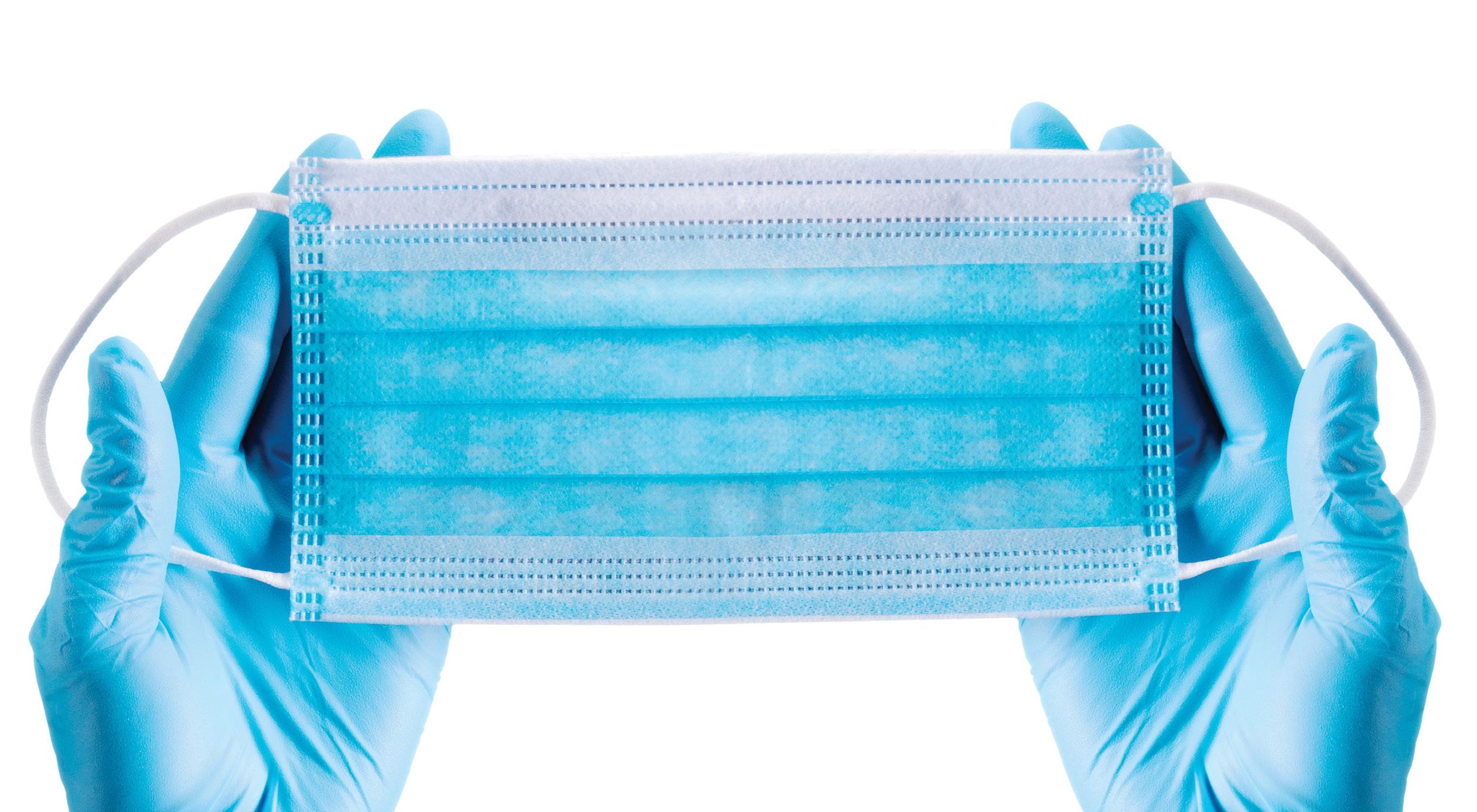

Dr. Powell: I know that we all wish that this would be the case but no, the COVID-19 pandemic is not officially over. We are seeing evolution of the virus over time with new viral strains emerging. The predominant strains currently circulating are variants of Omicron called BQ.1, BQ1.1 and XBB.1.5. They collectively make up over 85% of the strains detected. These strains are more infectious than the prior BA.5 variant that was the predominant strain over the prior 6 months. The good news is that these newer strains are not more severe than the BA.5 variant. Endemic means that the organism is circulating in the community on a regular basis and the infection is becoming more stable and manageable.
COVID-19 is transitioning to this status in many areas of the world, while other areas, such as China, are seeing high circulation and hospitalization rates. If COVID-19 will continue to circulate at a low chronic level year-round vs. becoming seasonal is not clear.
Medical Record: Dr. Powell, why has the SARS-CoV-2 virus been so persistent? Even with the annual influenza virus we see a seasonal pattern, however, COVID-19 appears to have been with us throughout the year. When we had viral surges during the COVID-19 pandemic, what role have virus variants played and why did it seem this virus could so readily mutate? Can we expect to continue to see such variants well into the future? What will be the role of new vaccines and how important are immunizations especially now for COVID-19 and Influenza?
Dr. Powell: SARs-CoV-2 appears to be less influenced by the season and has been able to mutate and become more infectious. Also, the antibodies produced are not long lasting and not totally protective. This has allowed the organism to infect patients even if they had prior infection or were immunized. The good news is that prior immunity does provide protection against severe disease and death. The new bivalent vaccines provide better protection against the Omicron variant as they contain proteins from the original COVID variant and the Omicron variant. It is important for everyone to be updated with the new bivalent vaccine to optimize their protection.
Medical Record: Dr. Chmielowski, what have you and your colleagues been seeing in your Pediatric offices over the past several weeks regarding viral infections? We have heard of the “tripledemic” of COVID-19, Influenza, and RSV all surging this Fall and Winter. Why is that the case? Are you able or is it even important to determine who has which illness? Are any of these three potentially more harmful to children and does the age of the child matter?
Dr. Chmielowski: We have certainly seen an increase in sick patients over the last several weeks, not only an increase in the number of patients, but also in the severity of their illnesses. Most children are suffering from respiratory symptoms and high, unrelenting fevers that last multiple days. Also, we are seeing so many children who essentially have been sick since September with back-to-back viral illnesses. It seems as if many aren’t going a week being totally healthy before they get sick again.
We have absolutely felt the pressure from the “tripledemic” of COVID-19, flu, and RSV. Flu and RSV seemed to hit harder and earlier than most years due to a combination of the lifting of COVID-19 restrictions and the multitude of novice immune systems amongst our “COVID babies” who are now being exposed for the first time to all these germs at the same time. In the outpatient world, unless we are concerned about the need for quarantine or are considering medication for a high-risk patient who presents within the first 48 hours of symptoms, which is rare, it isn’t necessary to perform the tests to see which viral illness they are suffering from. These tests are invasive and fairly expensive. As a rule, in medicine, it is never a good idea to perform a test that will not change your management! Therefore, we do not recommend performing viral tests unless it will change our treatment recommendations.
Supportive care is the recommendation, regardless of which virus is the cause, and the most important thing for us is to discuss with families the worrisome signs for which they should call us. For all these viruses, infants and children with compromised immune systems or underlying respiratory diseases are at highest risk. As with COVID-19 and flu, the RSV virus can affect infants, children, and adults, but infants are at highest risk for complications due to their small lung size and their inexperienced immune systems.

Medical Record: Dr. Chmielowski, how have you and your staff kept up these past several weeks with the volume of patients? Your number of phone calls must have been overwhelming. How do you triage who you must see and who you are comfortable treating over the phone? What is your sense of how parents/ families have managed all of this—including an onslaught of illness for almost three years now?
Dr. Chmielowski: Through many hours of hard work, teamwork, and dedication to the children and families of this community, we have gotten through it day by day. I am so blessed to work alongside the most amazing group of healthcare providers, as well as nonmedical staff, at Reading Pediatrics who make it possible for us to literally take hundreds of phone calls every day and provide care to the children in our neighborhoods.
We have done our best to keep the sick children out of the hospital. We’ve increased the number of sick appointments available, stayed open as late as possible in the office, added more weekend appointments, and provided more phone triage nurses to both answer the calls of worried parents and prioritize those whose children need urgent appointments from those that can be safely managed at home or be seen on a non-emergent basis.
continued on next page
continued from page 23
As a parent myself, I can vouch for the fact that we are exhausted from all this illness! We all just want our babies to be ok and to stop getting sick! To any parents reading this, we see you, we hear you, and we are here for you! We are so grateful for the hospital staff who have worked tirelessly to provide that added level of support for those patients who cannot safely be managed at home or in our outpatient offices.
Medical Record: Dr. Powell, what are you advising patients regarding how to do their best to stay well and keep their families well? When should someone seek care from their physician/ provider and in particular when a higher level of care, such as a trip to the Emergency Department, is necessary? Are our health care facilities currently being overwhelmed? If so, we certainly do not want patients making unnecessary visits and overwhelming our Emergency Care staff.
Dr. Powell: The first layer of protection is to stay up to date on vaccinations, including the COVID-19 bivalent booster and the annual flu shot. Patients should be cautious and conscientious during holiday seasons. They should consider wearing a mask in large crowds and should wash their hands frequently. If they are sick, they should stay home and test for COVID-19 with a home test. They should seek care if they are having difficulty breathing or are not able to eat and drink appropriately. Although our case numbers for COVID-19 have declined, we continue to have surge plans in place to care for patients if the numbers of patients increase further.
Medical Record: Dr. Chmielowski, schools are always caught on the front lines when we are confronted with readily transmissible respiratory diseases. How should school districts approach surges like we have experienced? Are vaccine mandates for school children (which we have had for years) important and necessary? Were mask mandates in schools beneficial during the peak of the COVID-19 pandemic? Do you think we might see these again or were they counter-productive?
Dr. Chmielowski: I certainly don’t envy the administrators within the school districts who are responsible for creating and upholding health and safety plans, nor the school nurses who have been inundated daily with so many sick students. Also, a huge thank you to all the teachers who are literally putting their own health and safety at risk every day just by going to work. This is not what they signed up for! I would recommend that the schools continue to reinforce good hand hygiene, encourage families to keep their
child/children home if they are sick, and have plans in place to handle situations where children are missing a lot of school due to illness. No one wants these children to fall behind academically. Vaccine mandates which have been in place for years for schools are certainly important and necessary. I honestly cannot imagine what things would be like if we were also having to deal with outbreaks of measles and chicken pox during this crazy time! Mask mandates during the peak of the COVID-19 pandemic certainly were beneficial and prevented transmission of not only COVID-19, but other respiratory illnesses. It will be interesting to see if those mandates will make a return in the event of another COVID-19 surge.
Medical Record: Dr. Powell, I hope it is not too early to take away some lessons from our Pandemic experiences over the past three years. What have we learned “good and bad” and how might such lessons help us prepare and respond better to recurrent as well as new emerging infectious diseases in the future?

Dr. Powell: The lessons learned are extensive, hard fought, and should not be forgotten. 1) We cannot let down our guard and de-fund public health. 2) Vaccinations save lives. 3) We need to respect microbes. We have become complacent regarding infectious diseases due to the advent of antibiotics and vaccines. The public has forgotten devastating infections such as polio, diphtheria, tetanus, and measles, for example. The public hasn’t seen patients affected with these infections and the morbidity and mortality caused by these diseases. 4) We must not politicize scientific research, treatment of infectious diseases, and immunization policies. 5) We understand, but the lay public doesn’t understand, that the scientific process adapts as we develop more information. This is not waffling on issues. This is the process of proposing a course of action, learning, and then modifying the course over and over again. 6) COVID-19 isn’t the last pandemic. We should anticipate that new viruses will emerge and that the current viruses will evolve, producing new variants. Infectious Diseases physicians have been forecasting a major influenza shift causing a flu pandemic. We are also seeing outbreaks of measles and polio in areas of the US among clusters of people with low vaccination rates.
Medical Record: Thank you both for your insightful comments and for all that you, your colleagues, and your staffs have done and continue to do to inform and care for the people of Berks County, especially through this time of the recent “tripledemic.”










Looking back at the General Assembly’s 202122 legislative session, PAMED’s legislative activity was robust. We saw the final passage of a number of bills in which PAMED was actively engaged. Additionally, PAMED was instrumental in blocking the passage of other proposals that were not consistent with our policy. The past year also marked the first time PAMED had been actively engaged in the budget process as we successfully secured additional funding for the state’s Primary Care Loan Repayment Program. This program provides loan forgiveness, presently up to $80,000, for physicians who choose to practice in a rural or underserved community for two years. PAMED secured an additional $2.5M to bring the program’s total allocation to $7M. This is the first time in more than a decade that the legislature has increased this line item.
While PAMED focused our advocacy efforts on the legislative arena, the undercurrent of “politics” seemed pervasive in 2022, as many legislators turned their focus towards the electoral process. While always sensitive to the politics that drives the development of public policy, PAMED successfully highlighted the impact that some legislative proposals would have on both physicians and the patients they treat. It will come as no surprise, especially to those who follow policy making at both the Federal and State level, that political discord has reached an all-time high. The legislative process should be about compromise. But it seems that the proverbial “middle ground” no longer exists in the traditional process of legislative compromise. Instead, both sides of the aisle are entrenched in their beliefs and reluctant to give in to the other side. Though exceptions do exist…they’ve just become harder to find.
PAMED is unique in that the breadth of our legislative interests ranges from legal reform to scope of practice to insurance reform, and everything in between, with each of these subjects garnering interests from different subsets of the General Assembly. As a result, our legislative priorities are often influenced by political expediency, and we often find ourselves shifting gears on issues depending on the interest and will of legislative leaders, committee chairs, and our legislative champions. Having said that, PAMED remains steadfast in its commitment to core priorities such as prior authorization reform and scope of practice.
Prior authorization reform has been a priority issue for PAMED and our 40+ member coalition of physician organizations and patient advocacy groups for over six years. Earlier in the past session, Senator Kristin Phillips-Hill introduced Senate Bill 225, and championed the effort to achieve senate passage before the 2022 summer recess. We were extremely pleased to see her efforts, and the efforts of many others, pay off when the Senate approved Senate Bill 225 in June. The measure was then referred to the House Insurance Committee, and PAMED was part of a coalition of individual organizations that met regularly with senate staff and representatives of the insurance industry to hammer out language that could ultimately pass the House of Representatives. The meetings were contentious, as one might expect, with the industry pushing back on nearly every provision of the original bill.
The bill was subsequently passed by the PA House and signed into law by Governor Wolf as Act 146 on November 3rd, a big win for PA physicians.


When it comes to legislation addressing scope of practice, PAMED has always viewed patient safety as our number one concern, not the potential competition from our non-physician colleagues. As a result of the COVID-19 waivers that granted pharmacists with expanded authority to provide COVID-19 vaccines, pharmacists began efforts in early January 2022 to further expand their role into the realm of childhood immunizations, seeking the authority to provide this service to their customers over the age of 5. Working in concert with the PA Academy of Family Physicians (PAFP) and the PA Chapter of the American College of Pediatrics (PA-ACP), that effort was stopped before it became part of a legislative proposal.
Though the child vaccine issue was sidelined, PAMED along with PAFP and PA-ACP did agree to allow pharmacists to provide seasonal flu and COVID-19 vaccines to individuals aged 5 and above. This compromise should serve to keep the issue of child vaccines off the table for the foreseeable future.
Other scope of practice issues, such as the interests of CRNPs and psychologists looking to either seek independent practice authority or expand their existing scope, were kept from advancing during this past legislative session. Though we expect all of the scope issues to return in the 2023-24 legislative session.
After the Pennsylvania Supreme Court issued a statement earlier last year that the current venue rule related to medical liability cases would revert to its pre-2003 status, PAMED engaged in advocating for the passage of House Bill 2660. This proposal, a legislative resolution that would have been the first step in potentially amending Pennsylvania’s constitution to place the question of judicial “venue” in the hands of the legislature instead of the state Supreme Court, unfortunately did not advance beyond the House Judiciary Committee. PAMED was not alone in advocating for the passage of House Bill 2660. We were joined by the Hospital and Healthsystem Association of Pennsylvania and several business groups, all of which are members of the Pennsylvania Coalition for Civil Justice Reform (PCCJR). Though the bill only won committee approval in the House of Representatives, it was successful in getting the issue before the legislature. PAMED will continue to work within the framework of PCCJR to ensure that Pennsylvania’s legal climate is improved.
The following are legislative initiatives that either made it to the Governor’s desk during 2022 or fell short of making it through the legislative process prior to the end of this legislative session.

Provides health care practitioners the authority to prescribe or personally furnish antibiotics to treat sexually transmitted infections, without having examined the individual for whom the drug is intended. This is in accordance with the Expedited Partner Therapy (EPT) in the Management of Sexually Transmitted Diseases guidance document issued by the United States Center for Disease Control (CDC).
Signed by the Governor as Act 147 of 2022
Amends the Health Care Facilities Act to allow ambulatory surgical facilities to perform certain permitted surgical procedures without seeking a waiver/exception from the Department of Health. The bill creates an updated waiver/exception process for surgical procedures not on the 2022 CMS ASC-CPL list or otherwise prohibited by state regulation.
Signed by the Governor as Act 87 of 2022
A Joint Resolution proposing five separate and distinct amendments to the PA Constitution.
1. Establishes that the PA Constitution does not grant any right to abortion or taxpayer funding for an abortion.
2. Allows the General Assembly to disapprove regulations by its own vote with no signature by the Governor required.
3. Eliminates a separate election for Lieutenant Governor. Allows the gubernatorial candidate to select his own running mate.
4. Requires all voters, whether in person or not, to present a government-issued form of identification prior to voting.
5. Requires the General Assembly to provide by statute for the auditing of elections and election results.
Current Status—Passed the General Assembly on July 8, 2022. Identical language must pass again this session and then the ballot questions can be presented to the voters at the next statewide election, possibly as early as the 2023 Primary Election. Given the outcome of the election and the uncertainty of what party will
continued from page 27
control the House of Representatives, Senate Bill 106 will likely not be considered in 2023, putting an end to a possible constitutional referendum question on the primary election ballot in 2023.

Introduced at PAMED’s request, this legislation would significantly alter the parameters by which restricted covenants could be used in physician employment contracts. The bill had been approved by the House Health Committee but did not advance any further. PAMED continues work toward finding a legislative pathway to see this bill through the process. Alternatives are also being explored to negate strong opposition from hospitals. PAMED will be seeking to have legislation addressing restricted covenants reintroduced in this current legislative session.
Amends the Patient Test Results Information Act. Provides for certain exclusions, and definitions within the Patient Test Results Information Act.
Current Status—Failed to win approval by the Senate Health and Welfare Committee. This measure will be reintroduced in 2023.
Amends the Controlled Substance, Drug, Device and Cosmetic Act to legalize the use of drug testing products like fentanyl test strips for personal use. PAMED supported this initiative and had adopted this change as a resolution at the 2022 HOD.
Signed by the Governor as Act 111 of 2022
Provides additional funding for the Primary Care Loan Repayment Program. Raises funding from $4.5 million to $7 million.
Signed by the Governor as Act 54 of 2022
Amends the Pennsylvania Drug and Alcohol Abuse Control Act (DAACA). This legislation brings DAACA into alignment with HIPAA to create a consistent and easily understandable standard and revises outdated regulations. The bill also provides consistency between statutory and regulatory language.
Signed by the Governor as Act 33 of 2022 (Note: HB 1561, now Act 32, was a companion bill that amended the Mental Health Procedures Act.)
This legislation, which PAMED supported, grants power to Pennsylvania’s Auditor General to audit Pharmacy Benefits Managers (PBMs) that do business with the state, namely through the Medicaid program. While the bill doesn’t provide complete PBM transparency, it is a good first step.

Signed by the Governor as Act 98 of 2022
Allows psychiatrists and other mental health providers to provide telehealth services.
Signed by the Governor as Act 76 of 2022
Allows name badges to have the health system a health care provider works for on the badge. Previously name badges had to be specific to the location the provider was working, becoming an issue for providers who work in multiple locations.
Signed by the Governor as Act 79 of 2022
Amends the Pharmacy Act to allow pharmacists and supervised pharmacy interns to administer influenza and COVID-19 vaccines to children ages five and older.
Signed by the Governor as Act 80 of 2022
As is customary before the start of a new legislative session, lawmakers from both the Senate and House of Representatives go through the process of electing their individual caucus leaders for the upcoming session. Below are the leaders in place for the 2023-24 legislative session.
Senate Democratic Leadership:
• Leader: Jay Costa (D-Allegheny)
• Appropriations Chair: Vincent Hughes (D-Philadelphia)
Rep. Mark Rozzi of Berks County (126th Legislative District) Elected Speaker of the PA House of Representatives
House Republican Leadership:
• Leader: Bryan Cutler (R-Lancaster)
• Whip: Tim O’Neal (R-Washington)
• Appropriations Chair: Seth Grove (R-York)
• Caucus Chair: George Dunbar (R-Westmoreland)
• Caucus Secretary: Martina White (R-Philadelphia)
• Policy Chair: Josh Kail (R-Beaver)
• Caucus Administrator: Sheryl Delozier (R-Cumberland)
House Democratic Leadership:
• Leader: Joanna McClinton (D-Philadelphia)
• Appropriations Chairman: Matt Bradford (D-Montgomery)
• Whip: Jordan Harris (D-Philadelphia)
• Caucus Chair: Dan Miller (D-Allegheny)
• Caucus Secretary: Tina Davis (D-Bucks)
• Policy Chair: Ryan Bizzarro (D-Erie)
• Caucus Administrator: Mike Schlossberg (D-Lehigh)
Senate Republican Leadership:
• Interim President Pro Tempore: Kim Ward (R-Westmoreland)
• Leader: Joe Pittman (R-Indiana)
• Whip: Ryan Aument (R-Lancaster)
• Appropriations Chair: Scott Martin (R-Lancaster)
• Caucus Chair: Kristin Phillips-Hill (R-York)
• Caucus Secretary: Camera Bartolotta (R-Washington)
• Policy Chair: Dan Laughlin (R-Erie)
• Caucus Administrator: Lisa Baker (R-Luzerne)
• Appropriations Vice Chair: Tim Kearney (D-Delaware)
• Whip: Tina Tartaglione (D-Philadelphia)
• Caucus Chair: Wayne Fontana (D-Allegheny)
• Caucus Secretary: Maria Collett (D-Montgomery)

• Policy Chair: Katie Muth (D-Montgomery)
• Caucus Administrator: Judy Schwank (D-Berks)
For more information about any of the items mentioned above, please visit the Advocacy Section of PAMED’s web site at www.pamedsoc.org/advocacy.

Reprinted from Lancaster Physician
On Saturday, Oct. 22, 2022, the Pennsylvania Medical Society held its first ever hybrid House of Delegates (HOD) meeting, allowing attendees to participate both remotely and on-site at the Hershey Lodge. This meeting was the first of its kind for PAMED. With the hard work of your Speakers and PAMED staff, and the flexibility of our delegates, the meeting was able to be held successfully.
In addition to robust discussion and commentary online ahead of the HOD meeting, delegates had a healthy and productive debate on many of the issues that face health care.
Here is a look at some of the resolutions that delegates either adopted or directed to PAMED’s Board for decision or further study. Keep in mind that this is not an exhaustive list. Proceedings and Actions of the 2022 HOD will soon be available online at www. pamedsoc.org/HOD.
COVID Vaccine Policies – Delegates voted to Not Adopt opposition to mandatory COVID vaccination policies and continue support for rigorous informed consent with respect to COVID vaccines. Delegates believed overwhelmingly that PAMED should, as a public health organization, continue to support vaccination policies.
Removal of Vaccine Exemptions – Delegates voted to Adopt as Amended the removal of non-medical childhood vaccine exemptions to support medical-only vaccine exemptions.
Pharmacy Childhood Vaccine Reconciliation – Delegates voted to Refer for Study the requirement for pharmacies giving childhood vaccines to reconcile them in PA-SIIS. PAMED will support and work with local agencies to encourage state-wide reconciliation of vaccines to avoid med errors.
Pharmacists Scope of Practice – Delegates voted to Adopt as Amended support of legislative efforts by the Pennsylvania General Assembly specifying that pharmacists notify the prescriber if intending to refuse to fill lawful prescriptions in an effort to increase patient safety.
Expansion of Optometry in Practices – Delegates voted to Adopt as Amended support of the Pennsylvania Department of Health in the prevention of the inappropriate expansion of optometry outside of scope (i.e., surgical and medical practice).

Telehealth for Psychiatric Care – Delegates voted in favor of the Reference Committee’s recommendation to Not Adopt PAMED’s support of telehealth over on-site services for the delivery of psychiatric care. Delegates and the Reference Committee believe telehealth is an important option for care but should not be the only or preferred option.
Support Single-Payer Healthcare – Delegates voted to Not Adopt the removal of opposition to a single-payer health care system. The Reference Committee’s suggestion of aligning with the AMA’s stance of not favoring a specific healthcare delivery model was supported by many of the delegates that were in attendance both virtually and in person as reflected in the final vote.
Parental Leave for Medical Students and Residents –
Delegates voted to Adopt as Amended the Reference Committee’s recommendation to support efforts by the American Medical Association (AMA) on the national issue of parental leave for students and residents. The AMA currently has policies that support parental leave for medical students and residents, which should be consulted and reviewed.
Hazard Pay for Residents in National Emergencies – Delegates voted to Not Adopt this resolution, which called on PAMED to support hazard pay provisions for resident physicians.
Removing Barriers in the OR for Women Donning a Hijab –Delegates voted to Refer for Study accommodations for people donning a hijab in the operating room. The PAMED Board of Trustees will study a) the removal of barriers in medical education and practice for hijabwearing women as well as b) advocacy as it relates to policy changes at medical schools and hospitals in the Commonwealth of Pennsylvania to include accessibility to accommodations, including non-transparent surgical hoods that cover the head and neck and/or medical-grade lowlint, light-colored, tightly woven, washable hijabs.
Creation of Access to Safe Quality Care Coalition – Delegates voted to Adopt as Amended the creation of a coalition of Pennsylvania Medical and Specialty Societies modeled after New Jersey’s access to care coalition, which includes a public facing website, with a mission to ensure the continued high quality of care provided by a physician-led team approach to medicine.
Analyzing the Financial Components of Graduate Medical Education in Pennsylvania to Ensure that Resident and Fellow Physician Compensation Equitably Reflects Their Workforce Contributions – Delegates voted to Refer for Study the issue of graduate medical education compensation in Pennsylvania. PAMED’s Board of Trustees will study the current compensation and financial benefits provided to resident and fellow physicians and whether PAMED should embark on advocacy in that regard.
Support for Safer Supply Testing – Delegates voted to Adopt as Amended support for safer supply testing devices for substance use. PAMED supports legislation removing fentanyl test strips and other medical or scientific devices and methods which test for toxic or hazardous substances from the list of drug paraphernalia under the Controlled Substance, Drug, Device and Cosmetic Act of 1972. PAMED will forward the issue to the AMA at the next appropriate AMA meeting.
Support for Protecting the Physician-Patient Relationship
Regarding Reproductive Health Care – Delegates voted to Adopt as Amended support for protecting the physician-patient relationship in matters specific to reproductive health care. PAMED will rescind the following policies: 5.998 Abortion, and 5.999 Testifying Before State Legislature. In addition, PAMED supports shared decision-making for the physician-patient relationship as it applies to all reproductive health, including abortion. PAMED opposes legislative measures that criminalize physicians for decisions with patients regarding the provision of reproductive health care as well as measures that expose patients to criminal or civil consequences due to receiving medical care.
Pain Management for Long-Acting Reversible Contraception and Other Gynecological Procedures – Delegates voted to Adopt as Amended the support for training physicians on the use of local pain control techniques for office-based gynecological procedures along with the discussion of pain control options, risks, and benefits with patients of such techniques. PAMED also encourages further research into evidencebased anesthetic and anxiolytic medication options for long-acting reversible contraception procedures and other office-based gynecological procedures.
Errors – Delegates voted to Adopt as Amended the recognition that preventable medical errors are not solely due to individual responsibility but also to health systems that need to be made safer. PAMED will
encourage institutions to make health systems safer by: 1) Viewing medical errors as challenges that must be overcome, 2) Fostering a culture of safety that focuses on system-based improvement, 3) Encouraging all individuals on the healthcare team to play a role in making the provision of health care safer for patients and healthcare workers, 4) Implementing voluntary, anonymous, or confidential error reporting systems and protecting them from legal discovery. Delegates voted to oppose the use of criminal penalties in errors of medical decision-making.

Regarding Supervision of Non-Physicians – Delegates voted to Adopt as Amended support for physicians in contract mandate issues and safeguards as it relates to the supervision of non-physician practitioners. PAMED will support whistleblower protections for physicians who report unsafe care provided by non-physicians to the appropriate regulatory board.
Delegates voted to Adopt as Amended support for medical waste reduction in the OR through a multidisciplinary task force. The task force will identify and promote best practices to minimize medical waste as well as identify and eliminate barriers in existing state laws, regulations, and healthcare organizational policies to achieve the goal of reducing medical waste related to medical procedures. PAMED will partner with AMA to craft state legislation permitting the dispensing of multi-dose medications upon discharge from healthcare facilities as well as the use of multi-dose medications for multiple patients in accordance with safe handling and dispensing protocols.
State Bypass of Physician Authority – On several occasions, the state legislature has raised the issue of physicians’ use of off-label medications in the treatment of COVID-19. This resolution, Adopted as Amended, will help to clarify PAMED’s position that off-label use of FDA-approved medications is appropriate provided the use is based on sound scientific evidence and for which the safety and efficacy have already been demonstrated.
Voter Registration for Patients – With the General Election less than two weeks away, delegates voted to Adopt as Amended support for non-partisan efforts that provide the necessary resources to help patients with voter registration and civic participation to those physicians who wish to engage in this activity. PAMED also supports efforts to address social and structural determinants of health by encouraging its members to engage in the electoral process.
 by John LeMoine, MS II Drexel University College of Medicine/Tower
by John LeMoine, MS II Drexel University College of Medicine/Tower
My name is John LeMoine. I am 24 years old and a second-year medical student at Drexel University College of Medicine at Tower Heath. I am a member of the inaugural class of the new campus in West Reading, PA. I was invited to represent the other West Reading medical students as part of the Berks County Medical Society, and to write this column for the Medical Record providing insight into the issues facing medical students. I wanted to take this first opportunity to introduce myself and discuss the life of a medical student today.

I was raised in Apex, North Carolina, a small but expanding town about twenty minutes southwest of Raleigh. I attended high school in Apex and stayed in NC to attend the University of North Carolina Chapel Hill for college, from which I graduated in 2020. Afterward, with the dream of attending medical school, I spent a year saving money while employed as a medical scribe in the UNC Emergency Department and as an education counselor at the Durham Museum of Life and Science.
It is well-established that medical school is a difficult endeavor, and the challenges begin well before sitting in a med school classroom. To matriculate, one must volunteer in the community, shadow physicians, attend four years of arduous undergraduate courses, establish the right contacts, and pass the infamous MCAT (Medical College Admission Test). But above all, one must discover and develop one’s unique passion for medicine in order to survive the gauntlet of becoming a physician.
I am asked quite frequently, by peers and essay prompts alike, why I chose to become a doctor. I have found that the best way to answer that question is with observations and anecdotes, one of
which I will share briefly. I used to drive by a lake on the way to work and during the summers and I would watch people swim and play, listening to their laughter. I realized that we, as humans, seem to live for something bigger than ourselves. I learned that happiness and the opportunity for good health were fundamental human rights. I knew that with my love for the sciences, I could help the most people attain this opportunity through serving as a physician.
Medical school is challenging, yes, but it is equally enjoyable. I love what I study, and I have experienced a family-like atmosphere with my exceptionally small class size of 40 students at the West Reading campus. We study together, struggle together, and succeed together. At least at the West Reading campus, gone is the day of cutthroat and selfishly competitive medicine. The students and staff collaborate and grow in the unique strengths of each other. We study the bulk of the material independently, and then meet to work in groups discussing relevant cases, interviewing standardized patients, and performing physical exams on high-tech mannequins. Students also partner to develop community engagement projects in Berks County, such as new student-run free clinics, Latinx advocacy groups, and even a pickle ball club!
Starting in May 2023, my fellow classmates and I will finish our classroom studies and begin our clinical rotations at Reading Hospital. We are all very excited to join the healthcare team and are dedicated to improving the health for all those living in and around Berks County. I look forward to sharing these experiences in the coming editions of the Medical Record.
Applications are being accepted now for this paid summer internship. The program is designed to allow college students to explore careers in healthcare through mentorship and clinical observing experiences with practicing physicians and leaders in local government and nonprofit organizations working to advance healthcare in our community.

Time commitment: 6 weeks full-time, Monday through Friday, June 5 through July 14, 2023.
Stipend: $2000 for each of TWO students
Eligibility: Students who will have completed at least 2 years of college at the end of the current semester and who have demonstrated an interest in a career in medicine or other field in the realm of health care, public health, or health policy. Priority will be given to students who are from the Berks County area or who are attending college in Berks County.
Primary activity: Research and write an article on a clinical topic or public policy issue in the healthcare field. The topic will be chosen in consultation with the scholarship program committee, and close supervision and mentorship will be provided by BCMS physicians and community experts in the chosen topic. The article will be published in the quarterly magazine of the BCMS, the Medical Record. Articles written by past scholarship recipients can be found on the BCMS website, berkscms.org, in the Fall editions of the Medical Record.
Additional activities will be determined by the intern’s interests and could include:
• Observing clinical practice, including surgery.
• Assisting the Executive Director of the BCMS for a few hours a week to learn about the operation of this nonprofit organization and the many ways it serves our members and our community.
• Shadowing members of the Pennsylvania Medical Society Governmental Affairs Office.
• Participating in panel discussions with practicing physicians and with medical students, to gain insight into the process of becoming a physician and the variety of career paths available.

• Attending didactic sessions at Reading Hospital in the Student Summer Internship program.
Application materials:
1) Resume
2) Personal statement of no more than about 500 words describing your career interests and how this experience would further those interests
3) An example of written scholarly activity (an essay or research paper)
4) Letters of recommendation are not required but will be considered.
5) Please indicate whether you are related to a Berks County Medical Society member and let us know how you learned of this internship.
Deadline to submit applications: Monday, March 6, 2023
(Notification will be by March 24)
Forward applications to Mr. T. J. Huckleberry, Executive Director, Berks County Medical Society at:
Email: tjhuckleberry@berkscms.org
Fax: (610) 375-6536
Berks County, PA has been selected by The National Institutes of Health, in collaboration with the Administration for Strategic Preparedness and Response (ASPR) at the U.S. Department of Health and Human Services, as the nationwide pilot site for a Home Test to Treat program.
This program is an entirely virtual community health intervention that will provide free COVID-19 health services: at-home rapid tests, telehealth sessions and at-home treatment for medically appropriate participants.

It is hoped the Home Test to Treat will promote equitable solutions and help to identify best practices that may save lives in this and future pandemics. The research team will identify and implement improvements that leave us in a much better position to respond to specific needs at the local, state and federal levels.
Interested persons in Berks County can join the program to access the available benefits at any time by going to www.test2treat.org and reviewing the study consent and enrolling. It is hoped that between 8,000 and 10,000 individuals will enroll in Berks County.


• Visit https://test2treat.org. You may also call call 1-800-682-2829.
• Fill out a short questionnaire to see if you are eligible to participate.
• Visit https://test2treat.org. You may also call call 1-800-682-2829.
• Fill out a short questionnaire to see if you are eligible to participate.
All services are no cost to you. You can access these services by visiting https://test2treat.org or calling 1-800-682-2829.
All services are no cost to you. You can access these services by visiting https://test2treat.org or calling 1-800-682-2829.
• Sign up! You can sign up for this program even if you are not sick.
• Take tests,if you start to feel sick. If you need tests, they can be mailed to you.
• Sign up! You can sign up for this program even if you are not sick.
• Access to a telehealth consultation if you test positive. You will be connected to a clinician who will check to see if a medication is right for you.
• Take tests,if you start to feel sick. If you need tests, they can be mailed to you.
• Get your medications. They can either be mailed home or picked up at a local pharmacy.
• Access to a telehealth consultation if you test positive. You will be connected to a clinician who will check to see if a medication is right for you.


• Complete questionnaires. Whether or not you test positive, you will be asked to complete questionnaires about your experience. If you complete the questionnaires on time, you will receive a $25 gift card.
• Get your medications. They can either be mailed home or picked up at a local pharmacy.
• Complete questionnaires. Whether or not you test positive, you will be asked to complete questionnaires about your experience. If you complete the questionnaires on time, you will receive a $25 gift card.
You must be at least 18 years of age, speak English or Spanish, and have an email account.
Who Can Participate?
You must be at least 18 years of age, speak English or Spanish, and have an email account.
National
https://test2treat.org
National Institute of Biomedical Imaging and Bioengineering, National Institutes of Health, Department of Health and Human Services, under Contract No. 75N92022D00010.
tests, telehealth, and medications -without having to leave home and at no cost to you.


Richard Joel Greene, MD, who died on October 24th, 2022, served the patients of the Berks County area, and was affiliated with Reading Hospital for over 40 years in the practice of Allergy and Immunology.

Dr. Greene was born in Jersey City, New Jersey, and graduated in 1965 from Penn State University. He returned to New Jersey to study medicine at the University of Medicine and Dentistry of New Jersey in Newark where he met his wife, Michele, in 1968, a year before his graduation. He interned at Martland Hospital Medical College in New Jersey and then completed his residency in Pediatrics in 1972 at the University of Wisconsin. He subsequently spent three years in the United States Air Force, rising to the rank of Major and serving as a staff pediatrician and hospital commander in Brindisi, Italy. Having completed his Air Force tour of duty, he returned home to pursue his Allergy and Immunology Fellowship at St. Christopher’s Hospital for Children in Philadelphia.
Following completion of his Fellowship, Richard and his family moved to Berks County where he would spend his career in the private practice of Allergy and Immunology caring for both adults and children. His consultation reports were not only complete, but they were also academically focused with a wealth of information. He had a warm and generous personality and was noted to be especially kind and responsive to his patients, many of them children. When a referral was made to Dr. Greene, one knew the patient would receive the best of care and the referring physician would learn a thing or two from the ensuing consult report.
Richard was a most trusted and respected colleague and will be truly missed by all of us who had the pleasure to know and with whom to share the care of our patients.
Dr. Greene is survived by his wife, Michele, three children and grandchildren, as well as many friends. In retirement he spent many relaxing hours at their home on Singer Island, Florida. It was also especially enjoyable during those years for Michele and Richard to return to Italy to enjoy the beauty of that country and reminisce about their earlier years there together.
Memorial contributions can be made in Dr. Greene’s name to:
Stephen Siller Tunnel to Towers Foundation
Colorectal Cancer Research at Penn Medicine’s Abramson Cancer Center
St. Jude Children’s Research Hospital
 by Raymond C. Truex, Jr., M.D.
by Raymond C. Truex, Jr., M.D.

When I joined the Johnson Reign Clinic and relocated to Reading in 1990, one of the first physicians I met at Reading Hospital was Clod Orquiza. (For the longest time, I thought his name was Claude.)
Clod was very welcoming, and I recall that we discussed the fact that I had visited his homeland, the Philippines, while I was serving in the military. I remember being very appreciative of his kindness and acceptance to the hospital staff.
The second time I saw Clod, several days later, he began the conversation with a joke, which I learned was his signature opening. And for every subsequent encounter, that’s the way things went, without ever hearing a story the second time. It was a habit that he never broke.
I learned from his wife, Karen, at his visitation, that Clod began to tell jokes as a way to understand the American culture when he first came to the United States, as at first he had difficulty understanding American humor.
That is not to say that Clod was not a serious physician. His empathy and surgical skill were evident in the many written memorials to his obituary in the Reading Eagle, attesting to the lives he saved and the souls he touched over his 32 years in practice at Reading Hospital. He served as the Chief of Urology at Reading Hospital from 1985 to 1998.
As mentioned earlier, Clod was a native of the Philippine Islands, born in Cabaio, Nueva Ecija, in 1933. He graduated with his M.D. degree from the University of the Philippines, Manila, in 1957, and left the Philippines to pursue further medical education in the United States.
Clod’s surgical training took him all over the United States, from a Rotating Internship in Kansas City, MO, to a Pathology residency in Washington, DC, and to General Surgery training at Hartford Hospital in CT and at Reading Hospital.
Finally, Clod completed a Urology residency at Albany Medical Center in NY before returning to Reading Hospital in 1969 to enter private practice with Drs. Barry Shultz and Joseph Leone.
His medical training and subsequent career exemplify Clod’s perseverance, resiliency, technical skill, humility, empathy, and dedication to his craft. His humor and self-effacing presence will be sorely missed by the Reading Hospital physicians, hospital staff, and patients of his era.
Dr Orquiza is survived by his wife, Karen Boyer Orquiza, a daughter, Maria, a son, Clodualdo Orquiza III, M.D., and many extended family members.
Contributions can be made in Dr. Orquiza’s memory to the Reading Hospital Foundation, PO Box 16052, Reading, PA 19612. Written condolences for Dr. Orquiza can be sent by email to www.kuhnfuneralhomes.com.


Once again, Drexel University/Tower Health Medical Students have shown that they are here in Berks County not only to study medicine, but to make a difference.
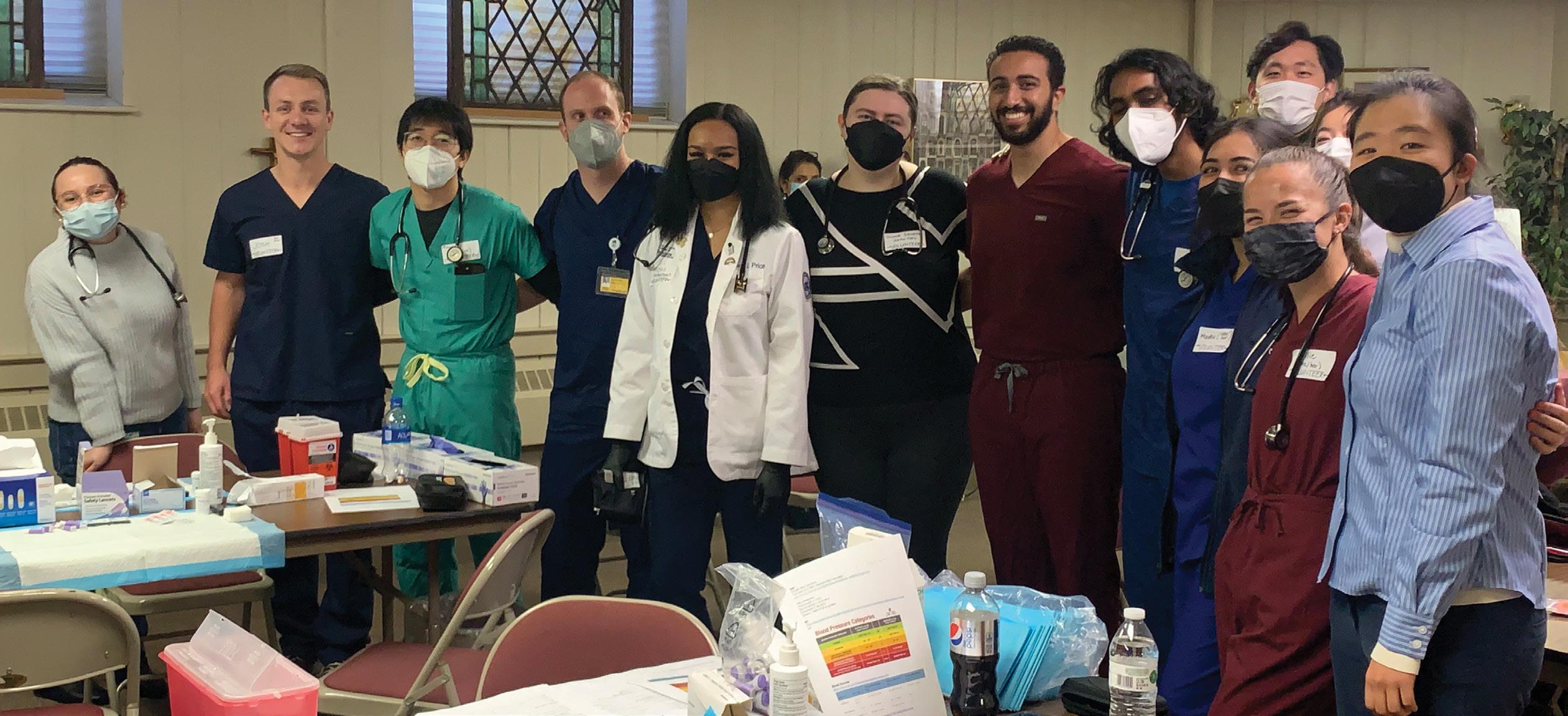
On Saturday, October 29th, a group of students joined with other community groups to sponsor a health fair at the LGBT Center of Greater Reading on Centre Avenue and provided health screenings and information for participants. As the photo shows, this was an enthusiastic group representing the very best of our profession.
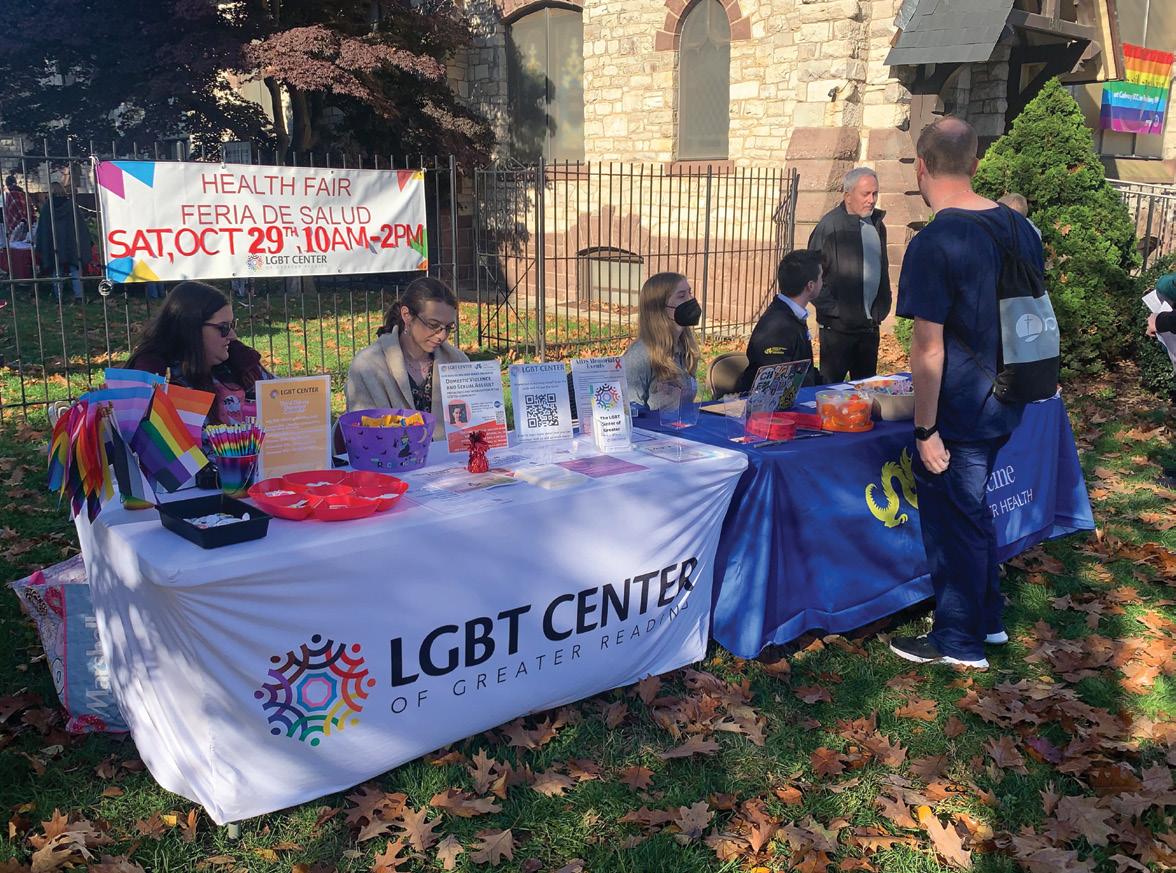








At BERKS EYE PHYSICIANS AND SURGEONS, we are happy to offer state-of-the-art and efficient care. Our doctors provide appropriate diagnosis and treatment, and fast feedback to you. Whether your patient has a sudden change in vision, cataracts, diabetes impacting vision, or even has a family history of glaucoma or macular degeneration, we would be honored to monitor and react to issues related to your patient’s eye health.

Domenic C. Izzo, Jr., MD
Cataract Surgeon
Advanced Technology
Lens Specialist
Laser Vision Correction – LASIK

Glaucoma and Dry Eye Treatment
Comprehensive Ophthalmology
Francisco L. Tellez, MD, FACS
Glaucoma Specialist
Glaucoma Surgery & Treatment
Cataract Surgery
Advanced Technology Lens Specialist

Comprehensive Ophthalmology
Kasey L. Pierson, MD Cornea Specialist
Cornea Surgery
Cataract Surgery
Glaucoma and Dry Eye Treatment
Comprehensive Ophthalmology
Peter D. Calder, MD
Cataract Surgery
Advanced Technology
Lens Specialist
Glaucoma Treatment
Dry Eye Treatment
Comprehensive Ophthalmology
Guri Bronner, MD Specializing in Diseases & Surgery of the Retina and Vitreous